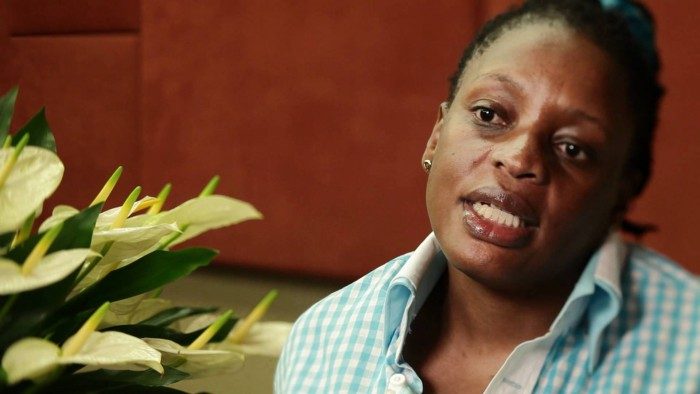


 PRISCILA Misihairabwi-Mushonga (PM) of the Movement for Democratic Change (MDC) led by Welshman Ncube, who sits in Parliament on the proportional representation ticket and was a minister for regional integration and international co-operation during the inclusive government of 2009-2013, is one of the most powerful women in opposition politics. The Financial Gazette News Editor, Maggie Mzumara (MM), had a one-on-one with her on a wide range of issues. Below is what came out of that interview.
PRISCILA Misihairabwi-Mushonga (PM) of the Movement for Democratic Change (MDC) led by Welshman Ncube, who sits in Parliament on the proportional representation ticket and was a minister for regional integration and international co-operation during the inclusive government of 2009-2013, is one of the most powerful women in opposition politics. The Financial Gazette News Editor, Maggie Mzumara (MM), had a one-on-one with her on a wide range of issues. Below is what came out of that interview.
MM: Following the 2013 elections where you were nominated for the proportional representation seat for Matabeleland South there was talk about some resistance of you from some sections of your party and a number of ugly rumours were coming from that. What was really going on? And what was the nature and magnitude of the resistance?
PM: You remember my position on that matter is I will not comment; it is a principle which I will not break even if I were to leave the party. If you need to hear those answers it will be best to talk to the president (of the MDC) himself.
MM: We also heard that the president of the party Welshman Ncube was shielding you. How far true is that?
PM: Again you need to hear those answers from the president himself.
MM: You stayed on and held onto the position never commenting on the matter publicly, how did you manage to weather such a storm in your internal politics?
PM: I actually didn’t survive the storm. If you noticed for the better part of 2013 I was not in Parliament I had some form of (stress-induced) breakdown which I am still recovering from.
MM: Now we have the re-unification of two MDC formations — yourselves and the Renewal Team — how is that coming up?
PM: The re-unification is coming up well. It’s just that given the holidays it slowed down bit but we are still within our deadlines.
MM: Is the re-unification likely to offer formidable competition/opposition to ZANU-PF in what specific ways?
PM: Some of us believe that ZANU-PF has stayed in power largely as a result of two issues. Firstly, the politics of personalities and secondly the inability of Zimbabweans to marshal both human skills and general resources. The re-unification project seeks to deal with those issues.
MM: How are the positions going to be shared?
PM: The debate and negotiations on positions has not begun. What is paramount is that everyone understands that it is not about positions but the principles of getting more people to deal with the challenges that face us as a nation.
MM: Are we likely to see you in any influential position?
PM: Definitely no.
MM: Why not?
PM: I have made a conscious and deliberate choice that I have been at the centre of many things in the party. There are many more people particularly women in my party with better capacity and energy and it is time that they too begin to take influential and critical roles.
MM: How would you summarise your experiences in politics to date?
PM: It’s been very difficult. I guess it is in the nature of politics that honesty is not sacrosanct so in the quest for power I have seen a sinister side of people and I have lost many friendships because in politics loyalty is a myth. One you consider a friend today for today’s convenience can easily turn their guns on you.
MM: Would you take it up all over again? Or is there anything you would do differently and why?
PM: I think politics is for those who are older; I took it while I was too young and naive. I was around 20/25. I regret not having spent time with my son and of course after my husband died I put personal relations in the dustbin and there are times I feel I should have tried harder to find a partner. Now that I am older, I do sometimes feel lonely but it’s too late to marry now. That ship has sailed.
MM: Next door we have seen the (former vice president) Mai (Joice) Mujuru’s persecution and you are considered the most powerful woman in opposition politics what impressions did that have on you if any? Can you relate at all by any chance?
PM: The Mai Mujuru saga is what had shaped my future decisions in politics, I think she could read the signs but was in denial having been part of most of her colleagues. The lesson for me is that people change because they are not GOD and any reliance on a human being is dangerous. Once the signs that you may be facing a battle appear, you either take on the fight of flight. On my part, I have made a conscious decision to deliberately take a back seat while those that feel they have better capacity to do work do so. I have been fighting for too long and the most painful and hurtful fight is internally with colleagues because it is difficult to explain.
MM: How so?
PM: The fights have been too much for me but I really don’t want to comment much on issues internal to the party.
MM: What greater significance did that whole Mujuru episode have on the experiences of women in politics in particular and the women’s agenda in general?
PM: The feminist movement still has to do an analysis on what happened with the Mujuru saga, save to say that if ever there are internal fights women have to have the breasts, since we have no balls, to mediate as women. We collectively failed to deal with the Mujuru issue. I hope that as I move from this position a woman walks in my shoes that way we don’t cede the spaces we would have worked collectively to have.
MM: Generally speaking, what have women brought to the political landscape of Zimbabwe?
PM: This Parliament has brought the greatest number of women’s issues (although) we may not have seen the results. Parliament narrative will never be the same, however, in terms of political parties in general. These past years have seen the worst fights and those fights have manifested themselves sometime publicly as women in Parliament have booed and abused each other. It has been one of the saddest part of my time in Parliament and ironically it has been the elderly women in the House that have led the abuse of other women.
MM: What can we expect from you going forward?
PM: I am excited about 2015. I am excited about creating a Priscila time. Am hoping that my friends outside politics will keep their promise in helping me write a book about sitting at the table, and I want to continue the war on sanitary wear I see that it is of national agenda and not a personal war so watch this space.
MM: Anything else you wish to mention I may not have touched on?
PM: I just want to salute you Maggie and Veneranda for continuing to give women a voice. Without you we would be invisible. I have watched both print and electronic media in Parliament and marvelled at how they treat us but the two of you have my accolades. We may not say it enough but thank you thank you and may God protect you and put you into more influential positions. Happy New Year.
newsdesk@fingaz.co.zw